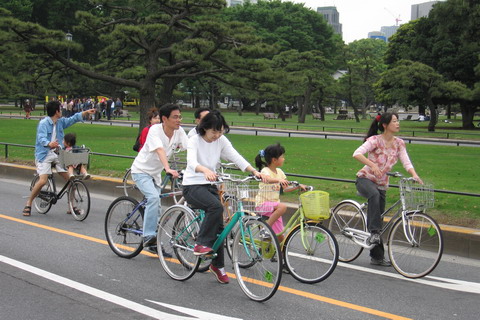
For many months now car ownership levels in Japan have been declining, from well before the recent oil price increases. As far as I know this is the first example of a highly developed economy where this is happening. Various reasons are offered including the aging population and stagnant economy, but projections based solely on these factors saw car ownership increasing for many more years yet.
More interesting observations note the high cost of car ownership and use, which includes parking charges (since on-street parking is not generally allowed) and tolls for using major roads, combined with an excellent railway system and of course a bicycle friendly environment. Car ownership seems to be far less of a necessity than it is perceived to be in the UK.
But most encouraging of all is the suggestion that there is a declining interest in car ownership, particular amongst the young. Perhaps the sophistication of electronic gadgetry means that there are other status symbols to aspire to. This could be the first sign of what may rapidly become a global trend as much higher fuel prices start to bite.

If car ownership rates start to decline here it would call into question almost all the transport planning of recent years. Would there then be any point in pursuing such unpopular policies as congestion charging and residents parking charges? Would there be any point in investing over £11 billion on expanding the capacity of the highway system? Would there even be any point in capital investment in public transport when this would only ever have been justified by projections of greatly increased congestion?




9 comments:
I can't say exactly the same thing is happening here, but Dutch car ownership seems to have peaked in 1994 and been slowly falling since then.
You can find some figures buried on page 63 of this report:
http://reports.eea.europa.eu/ENVISSUENo12/en/term2000.pdf
Note how through the 1970s up to 1994, car ownership here was higher per thousand inhabitants than in the UK, as expected due to higher affordability, however from 1995 onwards the figures here drop while the figures for the UK keep on climbing.
Even in 1994, this country had one of the highest rates of households without a car while at the same time having one of the lowest rates of households which couldn't afford a car (7 %).
The article linked to above makes no mention of cycling. However, I think it's pretty clear that having infrastructure which makes mass cycling possible and a large proportion of journeys made by bike also leads to fewer car journeys.
I think it's the combination of rapid transit for longer journeys and bicycles for local trips that provides the realistic alternative to car ownership (as opposed to just car use). Local bus services supplement that for people who can't or prefer not to cycle.
Thanks for linking to that report. Looking at the table on page 63 it seems to show that car ownership rates in the Netherlands dropped sharply from '94 (383) to '95 (364), then resumed climbing again, whereas you say they continued to decline. Am I missing something?
That drop in car ownership rates from 94to 95 looks very anomalous. Did something peculiar happen that year, like a lot of old vehicles get taken off the road? It would be wrong to take that anomalous result as indicative of a trend.
The second table is interesting. If you subtract the percentage of the population who can't afford to own a car (how do they work that out?) from the percentage without a car you are left with the percentage who could be said to be choosing not to have a car.
The Netherlands has 35% of such people, way more than anyone else, although the next up is another strong cycling country, Denmark, with 26%. Then Germany and Greece follow with 21%. Germany is also a country where cycling is popular. (Greece - a lot of people living on islands?) So cycling is clearly the key to reducing car dependency.
It's not so much that car ownership here dropped, but that it stopped rising in the same way as it did in the UK.
British car ownership was lower than the Dutch for most of the 70s and 80s, but that's reversed now even though affordability is higher here.
It's very closely related to the figures showing low choice of wanting to own a car. We've met several people here, professional sorts such as school heads, who don't drive and don't want to drive. They don't need to. Similar high figures for car non-ownership elsewhere tend to be linked to poverty and a car not being affordable. Here it's (mainly) a positive choice.
Bus usage is tiny here, of course. It's well provided for (as you can see in this link: http://hembrow.blogspot.com/2008/08/leaving-nothing-to-chance.html) but it's not really all that attractive when it's so easy to cycle everywhere.
It's most encouraging to hear some really good news like this, thanks Chris.
I can't help thinking that cultural factors will play a huge role here. Japan is still a very community minded culture, with a healthy Buddhist and Shinto ethical heritage, in contrast to poor old Blighty where a particular strain of Protestant and liberal individualism foster rampant selfishness (the 'get out of my way' progress mentality you mention) that we will have to work very hard to overcome.
As Prof Adams (UCL) points out, cars and roads tear community apart and isolate people, so we are stuck in a bit of a vicious circle. But the first step to overcoming a problem is to recognise that we have a problem.
Pedestria, I think you're right to mention cultural factors. I'm no expert on Japan but it appears to me to have a more homogeneous culture with fewer internal tensions arising from differences in class, wealth and ethnicity.
This in turn could be expected to make people feel more secure in the public realm and less vulnerable to gratuitous attacks while walking or cycling. The perceived need for the protection of a metal box would be correspondingly less.
Other countries where cycling is popular and the car has less of a stranglehold, like the Netherlands and Denmark, also appear (to this outsider anyway) to have more internal cohesiveness, perhaps because being small countries surrounded by powerful neighbours (not mentioning any names) tends to make their people more conscious of their need to pull together.
In practical terms this may mean that a Dutch or Japanese person riding a bicycle does not have the same expectation of being threatened or harassed by a fellow countryman as we do in the UK. Hence the much greater interest in helmet wearing in the UK compared to cycle friendly countries.
Chris, I can't offer any experience about Japan, but you're absolutely right that Dutch cyclists have no expectation of hassle.
We've now been here a year, and it's been the most peaceful year of cycling in my life. Not once have I had any threats, nasty comments, or any other unpleasantness at all from anyone as I've cycled here. I wrote about this a few days ago.
I find it interesting that people we've had to visit us often start off cycling here wearing the same fluorescent clothes and helmets as they'd wear at home. However, they usually abandon them after a day or two simply because they feel happy without them. The same happens in reverse to some Dutch people when they visit the UK.
Many of those who move from here to the UK give up cycling, even though it's been a habit from childhood.
So maybe the target for a true "Cycling City" would be that no one should feel the need to wear helmets or fluorescent vests when cycling.
I think that's a pretty good one line summary.
Subjective and social safety are very important in convincing people to cycle.
I lived and worked in Tokyo for about five years, so can give some input on the Japanese way of getting around.
Pedestria mentioned Japan's more community-minded culture in comparison to that of the UK. This was one of the more pleasant surprises to discover there. It is natural for communities to have more input over the upkeep of their neighbourhoods rather than leaving it all up to the local council. People tend to take time to clean their part of a communal area (a street, for example) as when everyone plays a small part, it improves the quality of life for all.
I often heard that Japan was an example of a culture that had 'communism from the bottom up' rather than the top down. As communities tend to be drawn from very similar ethnic stock, people often see others around them as 'like them' and so find it easier to connect the other people around them as part of their community. Although I'm a firm advocate of multiculturalism for breaking down boundaries between people, it was nevertheless very interesting to live amongst a much more monocultural community than that which I was more used to from growing up in the UK.
In Tokyo itself, there is very little need for a car, particularly with the streets themselves being so narrow and there being so little parking. Generally, a bicycle is sufficient for getting around one's neighbourhood. Mothers transport their children around on them and many bikes have baskets fitted to the front for taking shopping.
For a city of up to 34 million people (if you count the surrounding urban conurbations too) to function as well as it does, an excellent public transport infrastructure is vital. Tokyo's train systems reach virtually every part of the city, are very regular and you can usually set your watch to them in terms of punctuality. If you want to get anywhere in the city (other than from house to supermarket), this is really the only way to do it.
Post a Comment